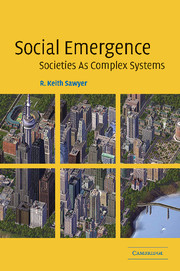Book contents
- Frontmatter
- Contents
- List of figures and tables
- Acknowledgments
- 1 Emergence, complexity, and social science
- 2 The third wave of social systems theory
- 3 The history of emergence
- 4 Emergence in psychology
- 5 Emergence in sociology
- 6 Durkheim's theory of social emergence
- 7 Emergence and elisionism
- 8 Simulating social emergence with artificial societies
- 9 Communication and improvisation
- 10 The Emergence Paradigm
- References
- Index
9 - Communication and improvisation
Published online by Cambridge University Press: 10 May 2010
- Frontmatter
- Contents
- List of figures and tables
- Acknowledgments
- 1 Emergence, complexity, and social science
- 2 The third wave of social systems theory
- 3 The history of emergence
- 4 Emergence in psychology
- 5 Emergence in sociology
- 6 Durkheim's theory of social emergence
- 7 Emergence and elisionism
- 8 Simulating social emergence with artificial societies
- 9 Communication and improvisation
- 10 The Emergence Paradigm
- References
- Index
Summary
Most sociologists assume that communication is not central to sociology's main concerns and that its study can be safely tucked away into the subfield of microsociology (symbolic interactionism, conversation analysis, sociolinguistics). In general, sociology assumes that all social constraint must be institutional; the implicit assumption is that communication is epiphenomenal – that it has no causal consequences, either for emergent macrophenomena or for individuals. Instead, the ultimate causal forces in social life are either institutions, networks, and group properties (for the collectivist) or rational actions taken in the context of pairwise gamelike encounters (for the individualist). Thus both of these opposed camps agree in their implicit assumption that communication is of only marginal concern to the sociologist (cf. Rawls 1987; Ritzer and Gindoff 1992).
In Chapter 10, I present a framework for the study of social emergence, and communication is central to that framework. This chapter sets the stage by providing several examples of how differences in communication result in different emergence processes and outcomes. In the first half of the chapter, I describe communication and emergence in three broad classes of artificial societies: those with reactive agents, cognitive agents, and collaborative agents. Differences among these artificial societies demonstrate that very specific features of the agent communication language have subtle and unintended causal effects on social emergence. In the second half of the chapter, I describe the important role of metapragmatic communication in creating the emergent dialogues of improvised conversations.
Information
- Type
- Chapter
- Information
- Social EmergenceSocieties As Complex Systems, pp. 170 - 188Publisher: Cambridge University PressPrint publication year: 2005
